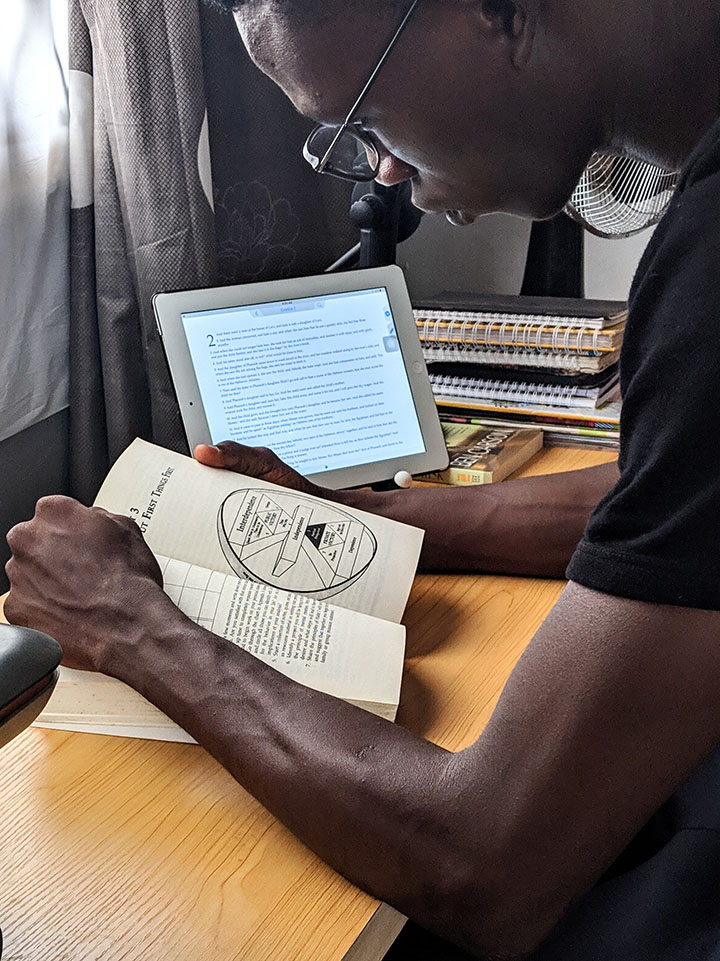The Reading Brain in the Digital Age: the Science of Paper Versus Screens Analysis
Introduction
Neuroscientist Maryanne Wolfe has written books Reader Come Dwelling house: The Reading Brain in the Digital World and Proust and the Squid: The Story and Scientific discipline of the Reading Brain on the differences in the brain between reading from print and digital, and oftentimes quotes MIT scholar Sherry Turkle, "we practice non err as a gild when nosotros innovate, merely when we ignore what nosotros disrupt or diminish while innovating."
Technology is moving us from impress to digital for immediately quantifiable reasons like cost and convenience, and the implication is there are no other differences betwixt the formats as if reading text from a book printed on paper and reading text from a device with a screen are exactly the aforementioned matter. But are nosotros ignoring something?
Educators should pay particular attention to contempo research involving the comprehension differences betwixt reading from impress versus reading from screens. Studies conducted over very long periods involving over 180,000 college students combined indicate there are student comprehension differences in some specific situations and an overall preference for print. New research is looking into why this is.
When considering substituting digital instead of impress considering of toll or convenience, nosotros need to inquire if we are giving annihilation upwards, and if so, what is information technology?
Nosotros reviewed 2 contempo studies that focus on comprehension differences and format preferences among college students, and fabricated a list of the most surprising facts. We too reviewed a recent study that begins to unravel why the comprehension differences may exist.
Here are the surprising facts from recent research most reading from impress:
Fact 1- Students desire print, print the PDF's they get, and call up they learn ameliorate when using print.

In a 2017 study involving 10,293 college students worldwide, a broad majority indicated a preference for print. There were 12 reading formats presented, and 78.8% of respondents chose impress every bit the preferred reading format. This was strongest for younger higher students and the strength of preference was less intense every bit bookish rank increased.
When asked to reply to the statement "I prefer to print out my class readings rather than read them electronically", 68.eight% agreed or strongly agreed.
Further review identified print was preferred when the content was lengthy (more than than 5 pages).
Also of importance, the study indicated that the students themselves idea they would do better if they studied using print.
Study: Academic reading format preferences and behaviors among university students worldwide: A comparative survey analysis. (2018) Diane Mizrachi, Alicia M. Salaz, Serap Kurbangolu, Joumana Boustany, on behalf of the ARFIS Enquiry Group. [https://journals.plos.org/plosone/article/file?id=10.1371/journal.pone.0197444&type=printable]
Fact 2- The "Digital Native" hypothesis that today's students have grown up in a digital world and won't perform likewise using print simply isn't true.

A meta-analysis of reading comprehension studies was published in 2018 and examined research involving over 170,000 higher participants from 2000-2017. Each written report tested students by having them read the same text from a screen and in print, and then take a test on the content they read.
Not simply did those reading from print perform better in testing than their peers reading from a screen, but surprisingly, equally time progressed during the study period, the performance of print readers remained consistent over the near twenty years of the study. However, during the aforementioned period the proficiency of the screen readers gradually diminished, as the ones identified equally "Digital Natives" entered the report. Theories as to why this is happening involve students developing habits early on on that favor skimming instead of deep reading.
This contradicts the notion that today'south students are "digital natives" and, therefore should practise better from digital than impress. Impress is benign for class materials even today, and a stiff inference can be fabricated from this report that the presumed digital natives need print.
Report:Don't throw away your printed books: A meta analysis on the furnishings of reading media on reading comprehension. (2018) Pablo Delgado, Cristina Vargas, Rakafet Acketman, Ladislao Salmeron. [https://world wide web.sciencedirect.com/science/article/pii/S1747938X18300101 ]
Fact iii- Reading from print on newspaper vs a device with a screen like a Kindle are different experiences and impact what information is remembered.

An experiment was recently conducted where participants had to read a long mystery story on a Kindle and also on a pocket sized print book. The research conducted by Anne Mangen, et. al. was published in 2019.
Previous studies have indicated that long informative texts, or long texts with some narrative elements, are comprehended amend when reading from impress versus a screen, and this experiment focused on comprehension of a literary piece of work read on a Kindle and in print.
The participants were then tested on various levels of comprehension such every bit engagement, recall, and ability to reconstruct the plot of the story. The results between the formats were considered identical overall, but in that location was an inferior performance from screen readers with respect to temporal and chronological details.
There are theories evolving as to why this may be, and also referenced in inquiry Mangen, et. al., conducted in 2013. Reading from impress is a multi sensory experience. Holding an object in your hand like a soft cover bound impress, or a difficult cover book, and turning pages while reading may exist adding important reference points from which the brain can recall the words it processes. "Where was it on the page?" & "How far was information technology in the book?" are two kinds of physical, 3D reference points that screens are not able to provide when reading, which might be impacting remembering when things occurred in the story. The progress in a print book tin be measured in the acme of a stack, the weight of the pages in one hand versus the other, irresolute over time. Scrolling, swiping, or pushing a button to electronically turn a page on a device is a 2D activity with less sensory involvement.
A more obvious reason is it's easier to focus when reading from print because there are no electronic distractions and considering nosotros recognize the text is fixed and the encephalon can focus more on the content. The "fixity" of the text on newspaper possibily requires less cognitive load when reading.
Studies are showing differences in testing outcomes between the formats favoring print and the side by side steps are to further understand why.
Decision
Two recent studies involving over 170,000 and ten,000 higher students each measuring comprehension differences & format preferences betwixt reading from print vs screen have produced some very surprising results.
Students prefer to impress out their course materials, especially for longer texts. PDF's greater than 5 pages were determined in one study to be the betoken where print is preferable. Students also adopt print because they recall they learn better from it.
Likewise surprising is students who are considered to be "Digital Natives" perform consistently as well equally those students from "less digital" eras when reading from print, but the meta assay noticed that "Digital Natives" perform worse reading from screens than the students from "less digital" eras. This may be from overemphasis on skills that promote skimming instead of deep reading.
Researcher Anne Mangen, et. al., conducted an experiment to identify the differences between reading a literary piece of work from print vs on a Kindle. Reading from print versus screens is beneficial for reading longer informational texts, or texts that are longer and may include narrative elements. For literary works, there is less of a difference between the formats except when testing for temporal or chronological details, in which case recalling those types of details is more than successful when reading from impress.
About us:
printMe1.com has created some innovative means to print, remix, and distribute OER PDF's to US students and bookstores at no additional toll beyond our already reasonable print on demand service prices.
If you are education and already take a impress option for OER PDF's, or are using an OER championship already in print, neat! Simply if you lot need an OER printing service, please check out our free PDF Hosting characteristic. It's a very piece of cake way to provide a print on demand pick for PDF materials used in grade that are OER, public domain, or works you agree the copyright on, and tin can exist used to direct students or bookstores in the US to a impress of your course fabric. If you have questions, delight contact united states here.

This work is licensed under a Creative Eatables Attribution 4.0 International
kerstetterthippost.blogspot.com
Source: https://www.printme1.com/blog/reading-from-print-vs-screens-the-3-most-surprising-facts
Belum ada Komentar untuk "The Reading Brain in the Digital Age: the Science of Paper Versus Screens Analysis"
Posting Komentar